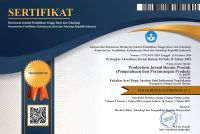Perancangan fasilitas stasiun berbasis kebutuhan dasar dan aktivitas penumpang kereta api jarak jauh: Studi kasus Stasiun Bandung
Abstract
Train travel is a popular mode of transportation in Indonesia, as proved by the increasing number of railway passengers in recent years. Railway stations serve as a crucial touchpoint for the passengers. Current studies on railway station facilities in Indonesia mostly evaluate the service quality and have yet to specifically address users’ basic needs and activities, and its influence on railway station design. This article discusses the findings of the basic needs and passengers’ activity mapping, utilising a mixed-method approach that integrates quantitative data obtained through passenger questionnaires (n=159) and qualitative data from observations and interviews (n=15). The results show that the priority basic needs of Indonesian intercity train passengers are: (1) safety, (2) reliability, (3) ease, (4) comfort, (5) cleanliness, and (6) responsiveness. These basic needs are then mapped onto the two main activity phases of intercity train passengers, namely: (1) departure phase: pre-boarding, boarding, and post-boarding, and (2) arrival phase: to continue the journey to the final destination. Identifying the basic needs and activities of intercity train passengers can provide a foundational framework for designing a railway station facility, thereby enhancing the overall passenger experience.
Keywords
Full Text:
PDFReferences
Ahmed, S. K. (2024). How to choose a sampling technique and determine sample size for research: A simplified guide for researchers. In Oral Oncology Reports (Vol. 12). Elsevier Ltd. https://doi.org/10.1016/j.oor.2024.100662
Alves, T., Natálio, J., Henriques-Calado, J., & Gama, S. (2020). Incorporating personality in user interface design: A review. Personality and Individual Differences, 155, 109709. https://doi.org/10.1016/J.PAID.2019.109709
Arafat, M. Y., Faggal, A. A., Khodeir, L., & Refaat, T. (2024). Harmonizing design and desire: Unveiling user-centered requirements for university buildings. Results in Engineering, 22, 102181. https://doi.org/10.1016/J.RINENG.2024.102181
Ar’ba Sabilla, R., & Herman, H. (2022). Kepuasan Penumpang terhadap Kualitas Pelayanan Jasa Kereta Api di Stasiun Bandung selama Pandemi Covid-19 dengan Metode IPA dan CSI. Journal of Sustainable Construction, 2(1), 1–12. https://doi.org/https://doi.org/10.26593/josc.v2i1.6035
Az Zahra, S. N., & Suryatiningsih, S. (2024). Evaluation and Improvement of User Interface Design of Bandung City APBD Website Using Human Centered Design Method. Procedia Computer Science, 234, 1791–1798. https://doi.org/10.1016/J.PROCS.2024.03.187
Badan Pusat Statistik. (2024). Jumlah Penumpang Kereta Api - Tabel Statistik - Badan Pusat Statistik Indonesia. https://www.bps.go.id/id/statistics-table/2/NzIjMg==/jumlah-penumpang-kereta-api.html.
Badan Pusat Statistik Jawa Barat. (2024, September 2). Jumlah penumpang kereta api di Jawa Barat Juli 2024 naik sebesar 8,89 persen. https://jabar.bps.go.id/id/pressrelease/2024/09/02/1155/jumlah-penumpang-kereta-api-di-jawa-barat-juli-2024-naik-sebesar-8-89-persen.html
Badriyah, N., & Kuswanto, A. (2023). Pengaruh Kualitas Layanan, Akses, Harga, dan Kompetensi Karyawan Terhadap Kepuasan Pelanggan PT Kereta Api Indonesia (Studi Kasus Stasiun Malang Kota Baru). Cakrawala Repositori IMWI, 6(1), 2023. https://doi.org/10.52851/cakrawala.v6i1.249
Bieger, T., & Laesser, C. (2001). The role of the railway with regard to mode choice in medium range travel. In Tourism Review (Vol. 56, Issues 1–2, pp. 33–39). https://doi.org/10.1108/eb058354
Bonnin, G., & Goudey, A. (2025). Creating a hospitable hospital: How colors, music, and scent in the servicescape reduce rumination and enhance the patient waiting experience. International Journal of Hospitality Management, 128, 104155. https://doi.org/10.1016/j.ijhm.2025.104155
Bullinger, H. J., Bauer, W., Wenzel, G., & Blach, R. (2010). Towards user centred design (UCD) in architecture based on immersive virtual environments. Computers in Industry, 61(4), 372–379. https://doi.org/10.1016/J.COMPIND.2009.12.003
Debby, S. R. Y. P., & Kania, I. (2018). Pengaruh Kinerja Pegawai Terhadap Kualitas Pelayanan Tiket Kereta Api di Stasiun Bandung. Jurnal Pembangunan dan Kebijakan Publik., 9(1), 21-28.
den Buurman, R. (1997). User-centred design of smart products. Ergonomics, 40(10), 1159–1169. https://doi.org/10.1080/001401397187676
Diah, F. (2024, November 13). 10 Stasiun KA Paling Sibuk pada Januari-Oktober 2024. https://travel.detik.com/domestic- destination/d-7636125/10-stasiun-ka-paling-sibuk-pada-januari-oktober-2024.
Dube, B. Z. (2021). Influence of Passenger Characteristics and Behavior On Railway Station Design: Review Paper. International Journal of Innovations in Engineering Research and Technology, 8(10). DOI: 10.17605/OSF.IO/5M7QU
Fadlilah, S. A. J., Sudo, S., & Novianto, D. (2024). Environmental User Preferences in Indonesian Cities Railway Station: Towards Sustainable Transit-Oriented Development (TOD). IOP Conference Series: Earth and Environmental Science, 1361(1). https://doi.org/10.1088/1755-1315/1361/1/012003
Fan, Y., Guthrie, A., & Levinson, D. (2016). Waiting time perceptions at transit stops and stations: Effects of basic amenities, gender, and security. Transportation Research Part A: Policy and Practice, 88, 251–264. https://doi.org/10.1016/J.TRA.2016.04.012
Fettouh El-Dmerdash, E., Nour, W. A., & Al-Dawla, M. K. (2022). The Role of Human Needs in Urban Renewal and Development of Urban Spaces for City Centers. Journal of Engineering Research, 6(4). DOI: 10.21608/erjeng.2022.265484
Gaber, A., Ahmed, W., Nour, E., Ahmed, M., & Al-Dawla, K. (2022). Sustainable Urban Design of Urban Spaces in Residential Areas and Their Impact on Human Behavior. Journal of Engineering Research, 6 (4).. DOI: 10.21608/erjeng.2022.265226
Gulliksen, J., Göransson, B., Boivie, I., Blomkvist, S., Persson, J., & Cajander, Å. (2003). Key principles for user-centred systems design. Behaviour and Information Technology, 22(6), 397–409. https://doi.org/10.1080/01449290310001624329
Gunawan, H., & Rubiyanti, N. (2024). Analisa Service Quality PT. KAI Menggunakan Metode Importance Performance Analysis Pada Stasiun Bandung. Jurnal Ilmiah MEA (Manajemen, Ekonomi, dan Akuntansi), 8(2), 1389-1399. https://doi.org/10.31955/mea.v8i2.4173
Go, R. Y. (2025). User behavior and interaction patterns. In Unveiling Social Dynamics and Community Interaction in the Metaverse (pp. 65–91). IGI Global. https://doi.org/10.4018/979-8-3693-8628-6.ch004
Hasanah, I. A. W., & Iriani, S. S. (2024). Pengaruh Harga Tiket Tarif Khusus, Kualitas Layanan Petugas, dan Fasilitas Fisik Stasiun Terhadap Keputusan Penggunaan Transportasi Kereta api. Jurnal Ilmu Manajemen, 12(2), 211–226. https://doi.org/10.26740/jim.v12n2.p211-226
Indahsari, S. N. & Wulandari, R. (2016). Analisis Ergonomi Lingkungan Ruang Tunggu Selatan Stasiun Bandung Berdasarkan Standar Kenyamanan Pengguna. Idealog: Ide dan Dialog Desain Indonesia, 1(3). https://doi.org/10.25124/idealog.v1i3.947
Indrosaptono, D., & Setiyawan, A. A. (2021). The Study of Pedestrian’s Convenience and Privacy Towards Pandanaran Crossing Bridge Condition. Architecture & Environment, 20(2).
J. Luca, E., & Ulyannikova, Y. (2020). Towards a User-Centred Systematic Review Service: The Transformative Power of Service Design Thinking. Journal of the Australian Library and Information Association, 69(3), 357–374. https://doi.org/10.1080/24750158.2020.1760506
Jang, W. yong, & Baek, S. yeol. (2024). The relative importance of servicescape in fitness center for facility improvement. Heliyon, 10(9), e29562. https://doi.org/10.1016/j.heliyon.2024.e29562
Javid Khan, R. A., & Lucas, J. D. (2025). Building for human experiences: An in-depth exploration of human-centric design. Journal of Building Engineering, 106, 112493. https://doi.org/10.1016/J.JOBE.2025.112493
Kabukye, J. K., Namagembe, R., Nakku, J., Kiberu, V., Sjölinder, M., Nilsson, S., & Wamala-Larsson, C. (2024). Implementing a Hospital Call Center Service for Mental Health in Uganda: User-Centered Design Approach. JMIR Human Factors, 11. https://doi.org/10.2196/53976
Klaus, P., Edwards, K., Norvik, D., Manthiou, A., & Luong, V. H. (2024). Inclusive servicescapes: the imperative of universal design principles. Journal of Services Marketing, 38(8), 1089–1098. https://doi.org/10.1108/JSM-04-2024-0150
Küpper, M., & Seyfried, A. (2023). Identification of social groups and waiting pedestrians at railway platforms using trajectory data. PLoS ONE, 18(3): e0282526. https://doi.org/ 10.1371/journal.pone.0282526.
Kwon, M., & Remøy, H. (2022). User-Centred Design Thinking: Application of UCDT theories to workplace management. A Handbook of Management Theories and Models for Office Environments and Services, 184-193. http://dx.doi.org/10.1201/9781003128786-16
Levyda. (2021). Kualitas Pelayanan Kereta Api dengan Pendekatan Pengalaman Penumpang dan Dampaknya pada Kepercayaan Penumpang. Jurnal Manajemen Transportasi & Logistik (JMTRANSLOG), 08(03). https://doi.org/http://dx.doi.org/10.54324/j.mtl.v8i3.728.
Lin, I. Y. (2004). Evaluating a servicescape: the effect of cognition and emotion. International Journal of Hospitality Management, 23(2), 163–178. https://doi.org/10.1016/J.IJHM.2003.01.001
Linda, R., & Rahimudin. (2024). Pengaruh On Time Performance Kereta Api Bandara YIA terhadap Kepuasan Penumpang Pesawat di Bandar Udara Internasional Yogyakarta. Railway Journal, 1(2), 1–7. https://doi.org/10.47134/rail.v1i2.2677
Madias, E. N. D., Christodoulou, K., Androvitsaneas, V. P., Skalkou, A., Sotiropoulou, S., Zervas, E., & Doulos, L. T. (2023). Τhe effect of artificial lighting on both biophilic and human-centric design. Journal of Building Engineering, 76, 107292. https://doi.org/10.1016/J.JOBE.2023.107292
Norman, D.A., & Draper, S.W. (1986). User Centred System Design, New Perspective on Human-Computer Interaction. Lawrence Erlbaum Associates, Hillsdale, New Jersey, 31-65.
Pradipta, P.P., & Faqih, M. (2015). Gaya Art Deco Pada Revitalisasi Stasiun Selatan Bandung. Jurnal Sains dan Seni ITS, 4(2). DOI: 10.12962/j23373520.v4i2.12572
Primayandi, A. M., & Gunawan, A. I. (2022). Analisis Persepsi Penumpang Kereta Api Jarak Jauh Terhadap Keamanan dan Kualitas Layanan di Stasiun Bandung. Prosiding The 13th Industrial Workshop and National Seminar.
Prilatama, M. N. (2024, July 9). Daop 2 Bandung Catat 1.797.967 Penumpang Kereta Api Jarak Jauh Semester 1 Tahun 2024 - Tribunjabar.id. https://jabar.tribunnews.com/2024/07/09/daop-2-bandung-catat-1797967-penumpang-kereta-api-jarak-jauh-semester-1-tahun-2024.
Purnomo, H., Achmadi, O., Hasan, I., & Mardijanto, M. (2019). User Centered Design: Design and Development Methodology of Seed Planting Tools. IOP Conference Series: Materials Science and Engineering, 598(1), 012121. https://doi.org/10.1088/1757-899X/598/1/012121
Putri, S. A., & Lissimia, F. (2020). Kajian Konsep Arsitektur Perilaku Pada Stasiun Kereta Api Antar Kota, Studi Kasus Stasiun Bandung, Stasiun Gambir, dan Stasiun Pasar Senen. PURWARUPA Jurnal Arsitektur, 4(2). https://doi.org/10.24853/purwarupa.4.2.47-54
Rahaditya, B.R., & Wirasmoyo, W. (2020). Mendekonstruksi Bangunan Bersejarah. Jurnal Arsitektur Zonasi, 3(1), 97-112. doi.org/10.17509/jaz.v3i1.17824.
Ranganathan, P., Caduff, C., & Frampton, C. M. A. (2024). Designing and validating a research questionnaire - Part 2. Perspectives in Clinical Research, 15(1), 42–45. https://doi.org/10.4103/picr.picr_318_23
Rosenbaum, M. S., & Massiah, C. (2011). An expanded servicescape perspective. In Journal of Service Management, 22 (4), 471–490. https://doi.org/10.1108/095642311111550 88
Saffer, D. (2011). Designing for Interaction, Second Edition: Creating Innovative Applications & Devices. Pearson Education.
Sarwono, S. W. (1992). Psikologi Lingkungan. Grasindo.
Shidiq, A. A. (2022). Perancangan Mesin Takik Bambu Dengan Pendekatan User Centered Design.
Sujono, R. (2018). Desain Alat Bantu Keselamatan dan Kegiatan Kerja Petani Cengkeh dengan Pendekatan User Centered Design .
Sutandi, A. C., & Paladan, F. O. (2017). Service Performance Evaluation in Large Railway Station in Indonesia. Jurnal Transportasi, 16(2), 125-132.
Stein, M., Meurer J., Boden A., & Wulf, V. (2017). Mobility in Later Life: Appropriation of an Integrated Transportation Platform. Proceedings of the 2017 CHI Conference on Human Factors in Computing Systems (CHI '17), 5716–5729. https://doi.org/10.1145/3025453.3025672
Taufiq, S. A., Wulandari, R., & Hanafiah U. I. .M. (2016). Efektivitas Lokasi Penempatan Papan Petunjuk (Signage System) Pada Lobby Stasiun Kereta Api Bandung. Idealog: Ide dan Dialog Desain Indonesia, 1(1), 40-62.
Trischler, J., & Scott, D. R. (2016). Designing Public Services: The usefulness of three service design methods for identifying user experiences. Public Management Review, 18(5), 718–739. https://doi.org/10.1080/14719037.2015.1028017
Van Hagen, M. (2011). Waiting experience at train stations. Eburon.https://doi.org/https://doi.org/10.3990/1.9789059725065
Van Hagen, M. (2022). Railway station and interchange design: A station design that perfectly fits the quality needs of passengers. In Transport and Sustainability (Vol. 14, pp. 19–40). Emerald Group Holdings Ltd. https://doi.org/10.1108/S2044-994120220000014003.
Venkatasrinivasaiah, S. T., Joshi, A., Christian, A., Padiya, P., & Bharne, S. (2025). A systematic review on hybrid approach for optimizing website usability using FULE methodology and usability heuristics reflecting user’s behavior and perception. Multidisciplinary Reviews, 8(8), e2025188. https://doi.org/10.31893/multirev.2025188
Wilkins, S., Hazzam, J., & Ireland, J. J. (2022). Servicescape in transnational higher education: the effects of campus design, physical environment and facilities on student experience and satisfaction. Journal of Marketing for Higher Education. https://doi.org/10.1080/08841241.2022.2139792
Wilkinson, C. R., & de Angeli, A. (2014). Applying user centred and participatory design approaches to commercial product development. Design Studies, 35(6), 614–631. https://doi.org/10.1016/J.DESTUD.2014.06.001
Yao, X., Jing, C,, Huang, Y., & Zhi, J. (2022). A Comparative Study of Passenger Multitasking Activities on Commuting and Leisure Electrified Intercity Railways. Journal of Advanced Transportation. 10.1016/j.jtrangeo.2023.103744
Yuda Bakti, I. G. M., Rakhmawati, T., Sumaedi, S., & Damayanti, S. (2020). Railway commuter line passengers’ perceived service quality: Hedonic and utilitarian framework. Transportation Research Procedia, 48, 207–217. https://doi.org/10.1016/j.trpro.2020.08.016
Yunus, M., Abdul Haris, R., & Joko Hermawan, D. (2023). Pengaruh Kualitas Pelayanan, Harga, dan Ketepatan Waktu Terhadap Kepuasan Pelanggan pada PT Kereta Api Indonesia (Persero) Daop IX Stasiun Probolinggo. Journal Management, Accounting, and Digital Business (JUMAD), 1(4), 591–60. https://doi.org/10.51747/jumad.v1i4.1405
DOI: https://doi.org/10.24821/productum.v8i1.14993
Refbacks
- There are currently no refbacks.
p-ISSN 2477-7900 | e-ISSN 2579-7328

This work is licensed under a Creative Commons Attribution 4.0 International License.
Like & Follow Us












